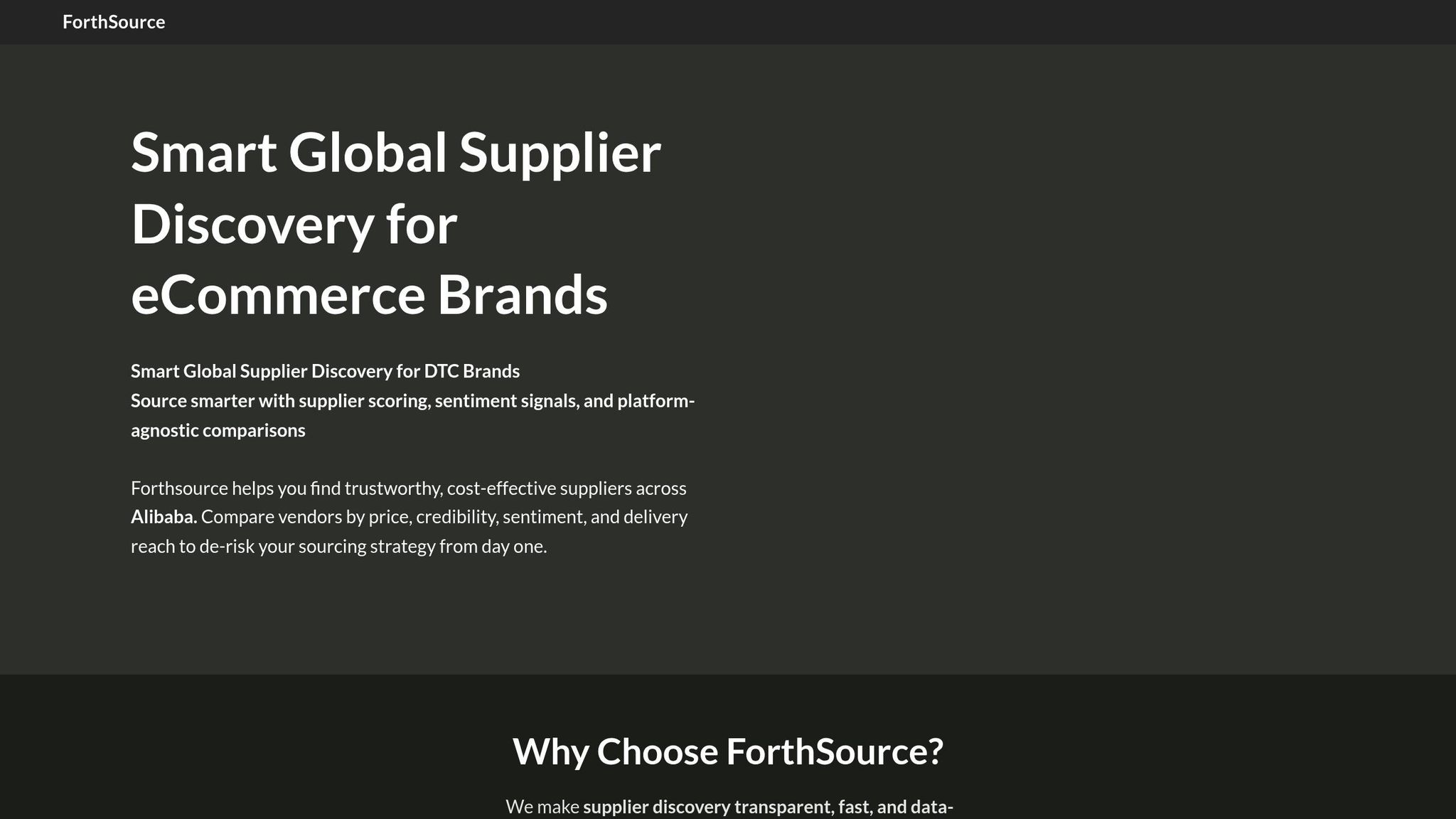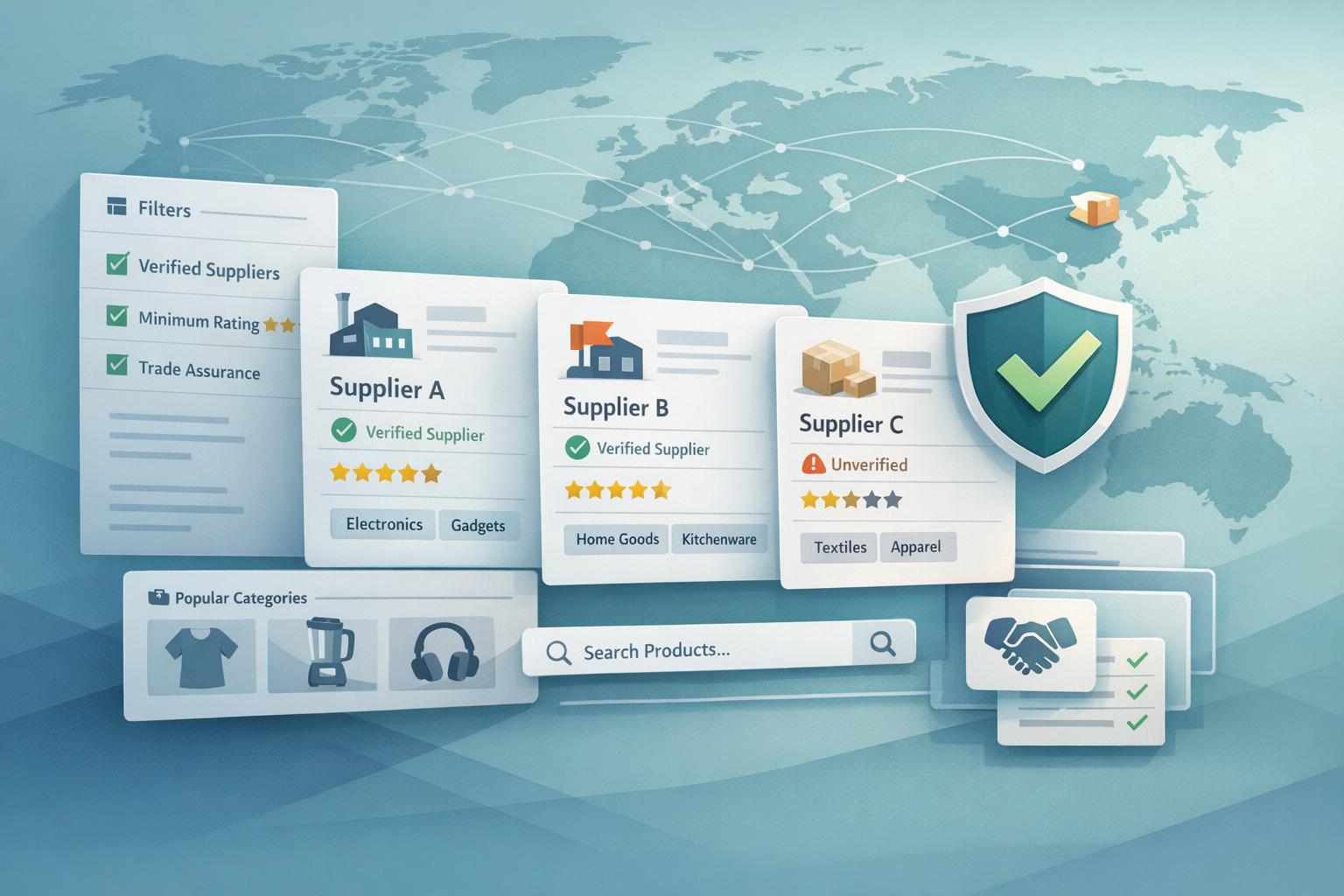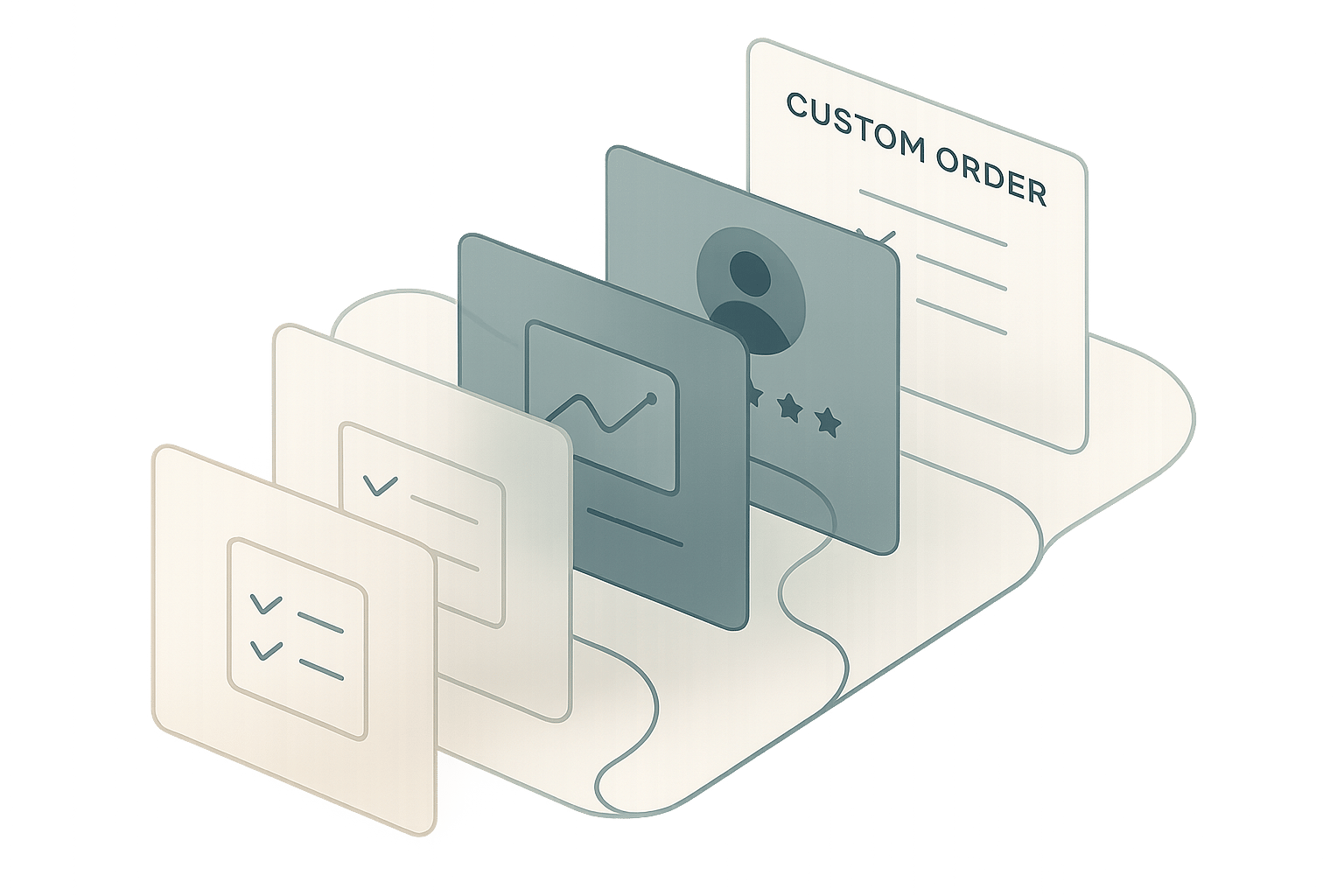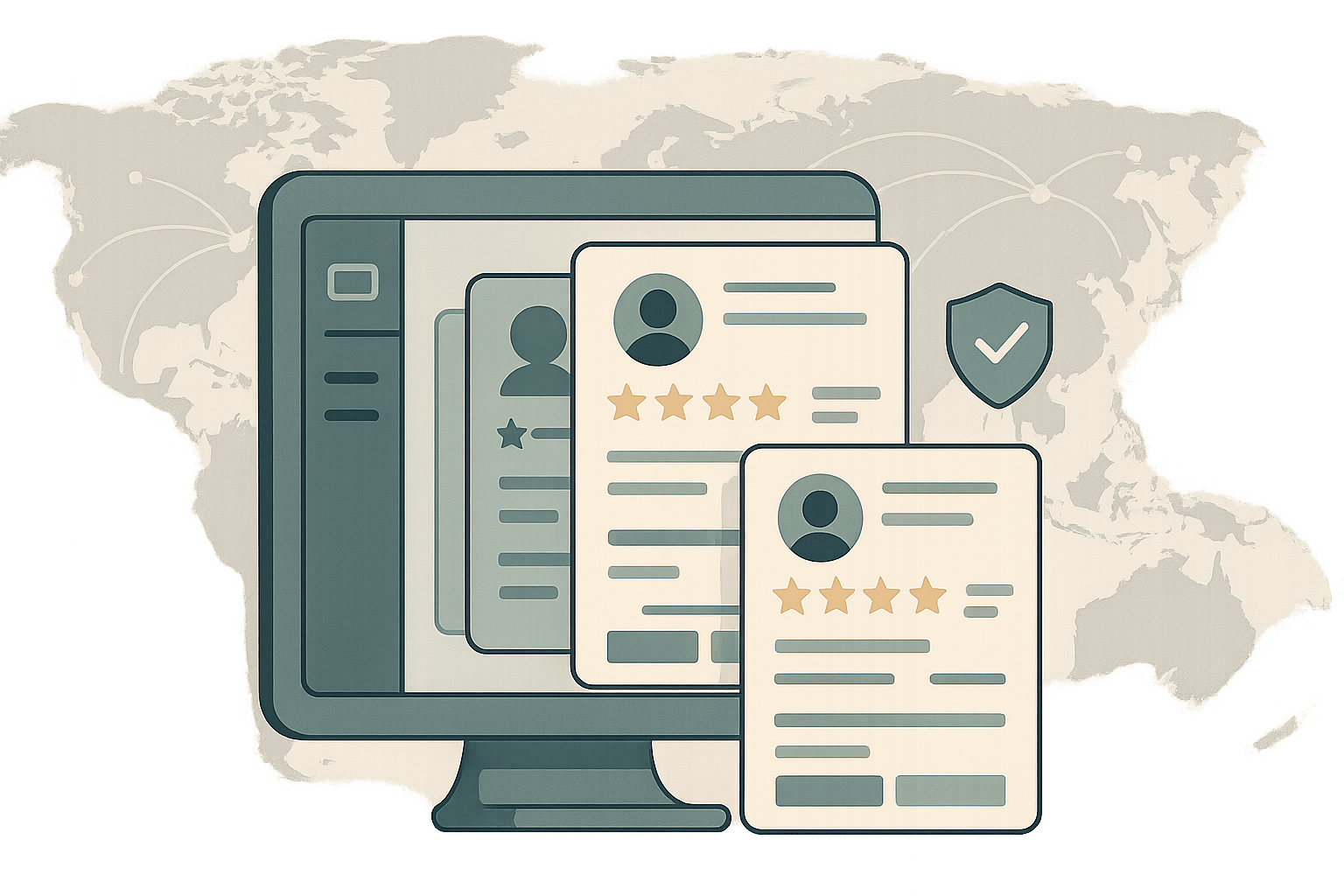Want to avoid supplier scams when sourcing from China? Here's what you need to know.
Supplier scams in China are becoming more sophisticated, targeting direct-to-consumer (DTC) brands with limited resources. Fraudulent tactics like fake business credentials, bait-and-switch schemes, and counterfeit products can lead to financial losses, delayed launches, and reputational harm.
Key Takeaways to Protect Your Business:
- Verify Business Licenses: Use China's NECIPS database to confirm supplier legitimacy.
- Check References: Contact past clients to validate supplier claims.
- Conduct Factory Audits: On-site visits reveal actual production capabilities.
- Evaluate Payment Methods: Use secure platforms like Alibaba Trade Assurance; avoid wire transfers.
- Spot Red Flags: Be cautious of unusually low prices, inconsistent documentation, and suppliers avoiding direct communication.
Real Example: EcoTech Accessories, a DTC brand, avoided a scam by identifying fake credentials, rejecting insecure payment methods, and conducting thorough research on a supplier that offered suspiciously low prices.
Tools to Simplify Verification: Platforms like ForthSource analyze supplier data, flag risks, and streamline decision-making with credibility scoring and real-time updates.
Avoid Sourcing Scams in China – Protect Your Business Now!
Case Study: DTC Brand Avoids Supplier Scam
This case study explores how EcoTech Accessories, a direct-to-consumer brand known for its sustainable phone cases, successfully sidestepped a supplier scam while sourcing manufacturing partners in China. Their experience highlights the importance of rigorous verification processes and offers insights into common warning signs that other brands should be aware of.
Starting the Sourcing Process
In early 2023, EcoTech began their search for manufacturing partners using platforms like Alibaba and 1688.com, with plans to meet potential suppliers face-to-face at the Canton Fair. The team identified 15 suppliers who claimed expertise in eco-friendly phone case production. Each supplier was asked to provide essential company details, production capabilities, and initial pricing for an order of 10,000 units.
To ensure a thorough evaluation, sourcing manager Sarah Chen developed a structured process. This included requesting product samples to assess quality and planning company verification reports and factory audits for the top candidates. These steps laid the groundwork for a detailed vetting process.
Spotting the Scam
About three weeks into their search, EcoTech received a proposal from a supplier called "GreenTech Manufacturing Co." The offer seemed highly appealing - GreenTech claimed to operate a 50,000-square-foot facility in Shenzhen and quoted prices that were 40% lower than other suppliers for similar products.
However, several red flags quickly emerged. The supplier’s business license contained conflicting information, with company names that didn’t match their email signatures. They refused factory audits or video calls, citing "temporary equipment maintenance", and demanded a 50% upfront payment via wire transfer while rejecting secure payment methods like PayPal or Alibaba Trade Assurance . These inconsistencies raised serious doubts.
"Watching out for vendor fraud red flags will protect you against those financial and reputational risks!" – Trustpair
Verifying Supplier Legitimacy
Instead of moving forward with GreenTech’s offer, EcoTech doubled down on their verification efforts. Sarah began by conducting online searches using the supplier’s name alongside terms like "scam", "review", and "complaint". These searches uncovered no credible business presence beyond a basic website that had been launched just three months earlier.
Next, the team used China's National Enterprise Credit Information Publicity System (NECIPS) to verify the supplier’s business license. When they entered the registration number provided, no matching company appeared, confirming the license was fake.
Additional checks revealed more inconsistencies. The landline number provided by the supplier was either disconnected or led to an unresponsive voicemail. A courier service was used to verify the physical address listed, only to discover it was a residential building with no signs of manufacturing activity. When EcoTech requested customer references, two contacts were unreachable, and one denied any connection to GreenTech.
Results and Key Takeaways
EcoTech’s meticulous verification process saved them from making a costly mistake. By avoiding a fraudulent supplier, they protected themselves from significant upfront losses and potential delays in their product launch. One key takeaway from this experience was clear: pricing that seems unusually low is almost always a red flag. Legitimate manufacturers operate within predictable margins, and drastic discounts without clear justification should immediately raise suspicion.
Transparency also proved to be a critical factor. Any supplier unwilling to provide proper documentation or allow verification should be disqualified without hesitation.
"Vetting suppliers isn't just about cost - it's about trust, reliability, and long-term partnership. Taking time to verify a supplier upfront can save you months of headaches and thousands of dollars down the line." – ThinkLabs Recruitment
Sarah also emphasized the importance of using secure payment methods. Moving forward, EcoTech requires all new suppliers to accept payments through platforms that offer buyer protection, such as Alibaba Trade Assurance.
This case demonstrates how a systematic approach - combining online research, document verification, direct communication, and reference checks - can effectively expose fraudulent suppliers. EcoTech’s diligence not only prevented financial loss but also reinforced the value of thorough supplier vetting in building reliable, long-term partnerships.
Best Practices for Checking Supplier Credibility
Drawing from EcoTech's experience, taking a systematic approach to verifying suppliers can help you avoid costly mistakes. Below, you'll find a practical framework for evaluating potential manufacturing partners before committing to a business relationship.
Key Verification Methods
Business License Verification
Ask for the supplier’s Chinese business license and verify its 18-digit registration number through the NECIPS database.
Factory Audits
Conducting factory audits provides a clear picture of a supplier’s actual capabilities. These audits, which typically cost between $300 and $900 in major manufacturing regions, can uncover crucial details about production capacity, quality control practices, and working conditions that are often impossible to gauge remotely.
Direct Communication Testing
Call the supplier’s landline to confirm their registration number and license details. Legitimate suppliers are generally transparent and cooperative, while fraudulent ones may avoid direct communication.
Reference Verification
Request at least three customer references and follow up with direct calls or emails to verify order fulfillment, product quality, and responsiveness.
Sample Evaluation
When ordering samples, always make payments to the supplier’s verified company bank account. This step can help identify suppliers that lack a legitimate business banking relationship.
By following these steps, you can uncover potential red flags and safeguard your business from unreliable suppliers.
Spotting Scam Warning Signs
Pricing Anomalies
Compare quotes across multiple suppliers to identify pricing that seems unusually low without justification.
Documentation Inconsistencies
Carefully review all documents for inconsistencies, such as mismatched names, newly launched websites, or reluctance to provide official paperwork. These are common red flags.
Communication Patterns
Be wary of suppliers who avoid video calls, refuse verification requests, or decline factory visits. Such behavior may indicate fraudulent activity.
Payment Method Restrictions
Suppliers insisting on large upfront payments via wire transfer while rejecting secure payment options like Alibaba Trade Assurance should be approached with caution.
Online Presence Verification
Search for phrases like “[company name] scam” or “[company name] dishonest” on search engines. Additionally, review supplier profiles on platforms like Alibaba or Global Sources, paying close attention to customer reviews, transaction history, and account age.
Using Technology for Verification
Automated Fraud Detection
AI-powered tools can analyze vast amounts of supplier data in real time. For example, the U.S. Treasury Department reported that AI helped prevent and recover over $4 billion in fraud during fiscal year 2024.
Database Integration
Verification platforms can cross-reference licenses, financial records, and transaction histories from multiple sources to generate detailed supplier profiles in minutes.
ForthSource's Intelligent Scoring System
ForthSource takes this a step further by aggregating supplier data from various channels. Using proprietary algorithms, it evaluates pricing, business credibility, and domain trust metrics. This method helps identify trustworthy suppliers while flagging potential risks early on.
Real-Time Monitoring
Continuous monitoring systems can track changes in a supplier’s financial stability, business status, or online reputation - early indicators of potential issues.
Company Verification Reports
For a deeper dive, consider detailed background checks, which cost between $100 and $200 per supplier. These reports provide insights into financial stability, legal compliance, and operational history, helping you avoid partnerships that could lead to significant losses.
Blending traditional verification techniques with advanced technology creates a strong defense against supplier fraud. By implementing these practices consistently, DTC brands can minimize risks and build lasting relationships with reliable manufacturing partners.
sbb-itb-633367f
How ForthSource Improves Sourcing Security

Modern sourcing platforms like ForthSource take supplier evaluation to the next level by blending automated data analysis with real-time credibility checks. At the heart of this process is a robust supplier scoring system that simplifies risk assessment.
ForthSource's Supplier Scoring System
ForthSource evaluates suppliers based on pricing, credibility, and sentiment, helping uncover risks that might otherwise go unnoticed.
This system uses a composite score that considers factors like data completeness, domain trust, and online credibility. By identifying red flags in real time, it eliminates the need for time-consuming manual reviews.
For instance, its price competitiveness analysis flags anomalies by comparing quotes from multiple platforms against market benchmarks. Suppliers offering unusually low prices without clear justification are flagged for further scrutiny.
Features That Support Safer Sourcing
ForthSource aggregates data from platforms such as Alibaba, AliExpress, and DHGate to provide a unified supplier reliability score. This cross-platform comparison saves you from manually searching multiple sites and offers standardized trust metrics.
It also detects common warning signs by analyzing factors like domain age, SSL certification, and customer sentiment from reviews. These insights are combined into a real-time trust metric that simplifies supplier evaluation.
Another key feature is ForthSource’s private, platform-free workspace. This ensures your sourcing activities remain confidential and untracked by vendors. Plus, it allows direct access to supplier product pages, enabling you to verify details without interference from middlemen.
Adding ForthSource to Your Workflow
Incorporating ForthSource into your sourcing process can significantly cut down the time spent on initial supplier screening. Alex Chan, Supply Lead at Luma Goods, shared, "We cut sourcing time by 40% using ForthSource's scoring system. Game changer."
The platform’s intuitive search tools make it easy to filter and compare suppliers based on critical factors like pricing and seller verification. For initial discovery, the scoring system helps you create a shortlist of reliable suppliers, so you can focus on those already vetted through automated checks.
With real-time data updates, ForthSource ensures supplier scores reflect current business conditions, alerting you to any emerging risks. Its side-by-side comparison feature lets you evaluate multiple suppliers at once, highlighting reliable options while flagging concerning trends. This streamlined approach simplifies supplier verification and helps you make informed decisions with confidence.
Conclusion: Key Points for Avoiding Supplier Scams
EcoTech’s experience highlights the importance of safeguarding your brand against supplier scams. By combining thorough research, practical measures, and modern tools, you can create a robust strategy to protect your business.
Thorough due diligence is your strongest shield. Always confirm supplier business licenses, verify references, and validate factory locations before making any payments. These steps can help you spot potential scams early. Legitimate suppliers are usually cooperative with such checks, while fraudulent ones often avoid them .
Practical measures add another layer of security. Opt for secure payment options like escrow services or trade assurance, place small test orders initially, and establish clear communication protocols. Be wary of suppliers offering prices that seem too good to be true or asking for payments to personal accounts - these are common warning signs of fraud .
Use tools like ForthSource to simplify supplier evaluations. Platforms like this provide real-time credibility scoring, analyzing factors like pricing trends, customer reviews, and domain trust. This can save you time and reduce risks by offering a comprehensive view of a supplier's reliability.
FAQs
What are the key warning signs to watch for when choosing suppliers in China?
When assessing suppliers in China, there are several warning signs to keep an eye on. These include ongoing quality problems, reluctance or inability to share important documentation such as business licenses or certifications, and conflicting business information. Other concerns might be poor communication, a lack of openness, prices that seem too good to be true, and frequent delays in delivery.
Being mindful of these issues can help you steer clear of scams or unreliable partners. Tools like ForthSource can make the process easier by offering real-time data and credibility scores, helping you identify dependable suppliers more efficiently.
How does ForthSource help DTC brands verify reliable suppliers and avoid scams?
ForthSource makes supplier verification easier for DTC brands by pulling data from platforms like Alibaba, DHGate, and AliExpress. It uses a custom scoring system to assess suppliers on pricing, credibility, and sentiment, helping brands spot reliable partners with ease.
By providing real-time data and in-depth quality insights, ForthSource minimizes the chances of working with unreliable or fraudulent suppliers. This efficient approach helps brands save time, avoid unexpected costs, and make smarter sourcing decisions.
How can a business verify if a supplier in China has a legitimate business license?
To confirm the authenticity of a supplier's business license in China, begin by asking for a copy of their license and thoroughly examining the details. Pay close attention to the business name, registration number, and scope of operations to ensure they align with the information the supplier has shared. It's a good idea to cross-check these details with official government records for additional verification. Also, confirm that the license is current and explicitly includes the products or services you plan to source. These precautions can help you ensure you're partnering with a legitimate and authorized supplier.


